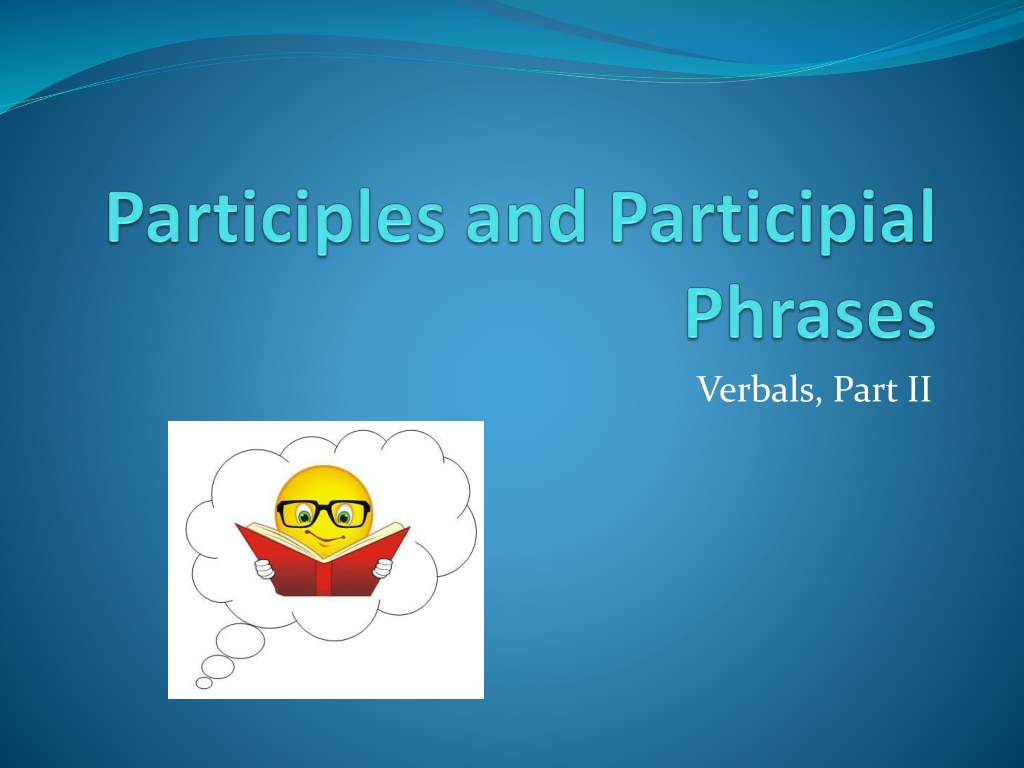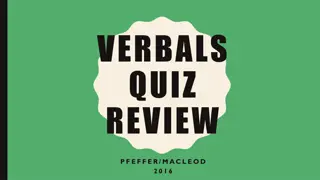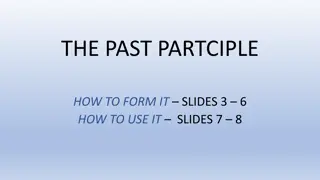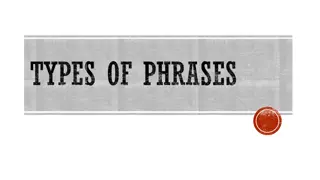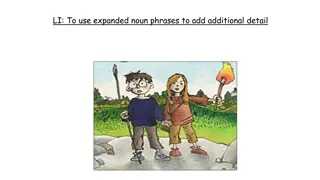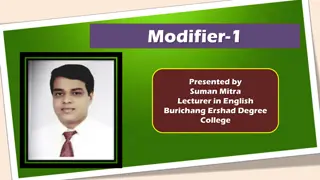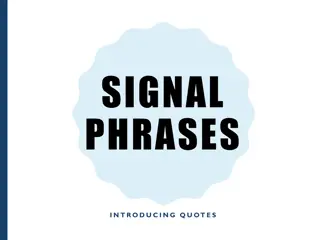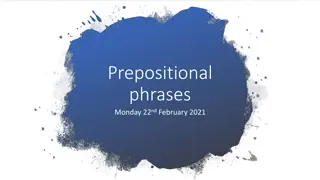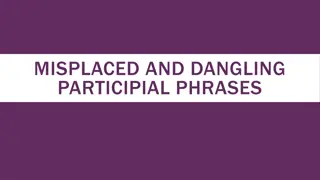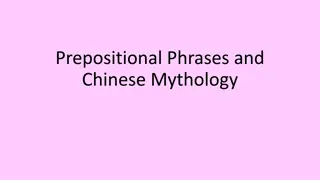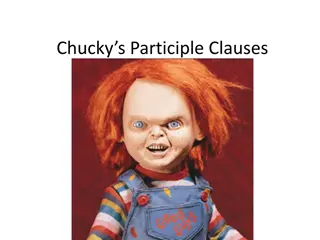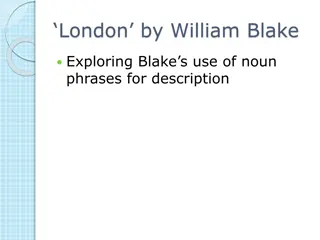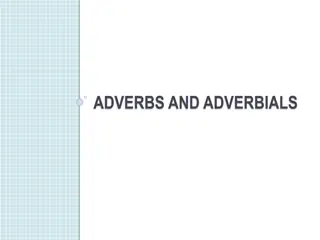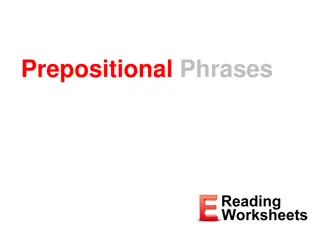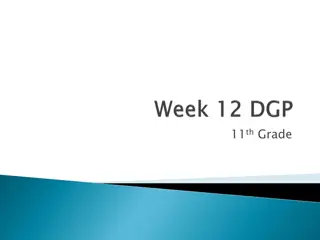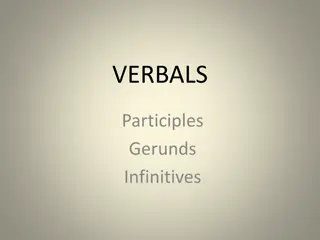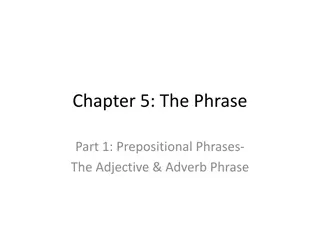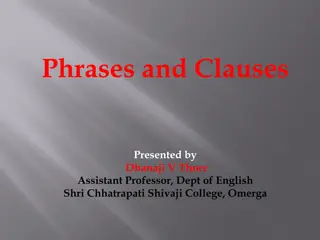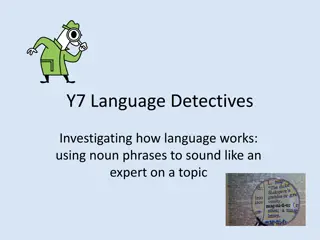Understanding Participles and Participial Phrases
Learn about participles and participial phrases, which are verbals that act as adjectives. Understand the difference between participles and verbs through examples and practice exercises. Enhance your knowledge of grammar with fun activities and explanations.
Download Presentation

Please find below an Image/Link to download the presentation.
The content on the website is provided AS IS for your information and personal use only. It may not be sold, licensed, or shared on other websites without obtaining consent from the author. Download presentation by click this link. If you encounter any issues during the download, it is possible that the publisher has removed the file from their server.
E N D
Presentation Transcript
Todays Purpose Students will be able to define and identify participles and participial phrases. A verbal is a word that is formed from a verb, but acts as another part of speech. A participle is a type of verbal. ARE YOU TAKING NOTES? Okay, let s repeat the definition of a verbal together at the count of three. 1,2,3...
Definition of a Participle A participle is a verbal that acts as an adjective. By the way, what is an adjective? Remind your row partner. A present participle ends in ing A past participle ends in ed (regular verbs) or an irregular past tense ending
Participle or Verb? That dripping faucet is so annoying! You are dripping water all over the floor!
Participle or Verb? That dripping faucet is so annoying! In this sentence, dripping is a participle. It ends in ing (like a verb), but it describes the faucet so it is acting as an adjective. You are dripping water all over the floor! In this sentence, dripping is a verb. It is not describing a noun; it is showing action.
Participle or Verb? 1. Oh no! Sally fell and cracked the window! 2. That cracked window will have to be replaced. Which sentence contains a participle one or two? Hold up your fingers!
Participle or Verb? 1. Oh no! Sally fell and cracked the window! 2. That cracked window will have to be replaced. Which sentence contains a participle one or two? Hold up your fingers! IF YOU HELD UP TWO FINGERS: YAY! In sentence two, cracked is a participle. It acts as an adjective describing the window.
QUICK PRACTICE - IN YOUR NOTES, WRITE THE PARTICIPLE IN EACH SENTENCE. IF THERE IS NO PARTICIPLE, WRITE NO PARTICIPLE. 1. The crying baby woke the whole house up. 2. I need to stop and fix this broken wheel. 3. I was running down the street when I tripped on a rock. 4. I am afraid to go into that deserted building. 5. Stop spilling cereal all over my laptop! Ready for corrections?
QUICK PRACTICE - IN YOUR NOTES, WRITE THE PARTICIPLE IN EACH SENTENCE. IF THERE IS NO PARTICIPLE, WRITE NO PARTICIPLE. 1. The crying baby woke the whole house up. _________ 2. I need to stop and fix this broken wheel. _______ 3. I was running down the street when I tripped on a rock. No Participle 4. I am afraid to go into that deserted building. ____________ 5. Stop spilling cereal all over my laptop! No Participle Ready for corrections?
Participial Phrases A participial phrase is made up of a participle and its modifiers. Screaming like a banshee, my little brother ran into the room. Screaming like a banshee is a participial phrase that describes my little brother. Yiiii!
Another Example of a Participial Phrase The firefighter, risking his life, saved the children from the fire. RISKING HIS LIFE IS A PARTICIPIAL PHRASE, BECAUSE IT CONTAINS THE PRESENT PARTICIPLE RISKING, BUT THE ENTIRE PHRASE IS USED TO DESCRIBE THE FIREMAN.
Participial Phrase Practice In your notes, write the participial phrase in each sentence. 1. Breathing searing fire, the dragon attacked the village. 2. The villagers ran, trembling in fear and amazement. 3. The dragon, belching smoke, pursued them. 4. The villagers, being very slow and puny, could not escape. 5. Satisfied after his large meal, the dragon took a nap. Ready for corrections?
Participial Phrase Practice In your notes, write the participial phrase in each sentence. 1. Breathing searing fire, the dragon attacked the village. _________________________ 2. The villagers ran, trembling in fear and amazement. ________________________________________ 3. The dragon, belching smoke, pursued them. __________________ 4. The villagers, being very slow and puny, could not escape. _____________________________ 5. Satisfied after his large meal, the dragon took a nap. ________________________________
Dangling Participles Participial phrases can be confusing if they do not describe the noun DIRECTLY before or after them. Beware of the dreaded DANGLING PARTICIPLE ! The little girl was walking her dog wearing pink sunglasses. The little girl wearing pink sunglasses was walking her dog. ? or
Assignment: Write the participle or participial phrase in each sentence. This will be turned in. 1. Marsha cut her foot on the shattered glass. 2. Hoping to make a good impression, Jake dressed up for his date. 3. My dad, believing he is hilarious, tells terrible jokes. 4. The howling wind rattled the windows. 5. It s good to see your smiling face again! 6. Tarzan, swinging through the branches, rushed to Jane s aid. 7. I am all worn out from that exhausting test!
Corrections 1. Marsha cut her foot on the shattered glass. 2. Hoping to make a good impression, Jake dressed up for his date. 3. My dad, believing he is hilarious, tells terrible jokes. 4. The howling wind rattled the windows. 5. It s good to see your smiling face again! 6. Tarzan, swinging through the branches, rushed to Jane s aid. 7. I am all worn out from that exhausting test!
